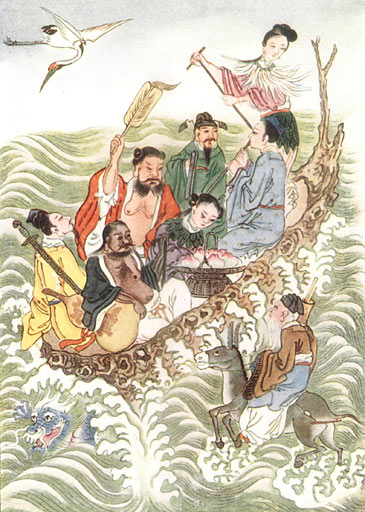|
Iron-Crutch Li
Li Tieguai (Mandarin: ; lit. "Iron Crutch Li") is a Chinese mythological figure and one of the Eight Immortals in the Taoist pantheon. He is sometimes described as irascible and ill-tempered, but also benevolent to the poor, sick and the needy, whose suffering he alleviates with special medicine from his Calabash gourd. He is often portrayed as an ugly old man with a dirty face, a scraggly beard, and messy hair held by a golden band. He walks with the aid of an iron crutch and often has a gourd slung over his shoulder or held in his hand. He often is depicted as a clown figure who descends to earth in the form of a beggar who uses his power to fight for the oppressed and needy. The legend says that Li was born in the Yuan dynasty (1279–1368), and was originally named "Li Xuan". However, in folklore, he is depicted as Laozi's apprentice, hence he should have lived in the sixth century BC. Apotheosis The Eight Immortals became immortals by means of practising Taoist magical art ... [...More Info...] [...Related Items...] OR: [Wikipedia] [Google] [Baidu] |
Standard Chinese
Standard Chinese ()—in linguistics Standard Northern Mandarin or Standard Beijing Mandarin, in common speech simply Mandarin, better qualified as Standard Mandarin, Modern Standard Mandarin or Standard Mandarin Chinese—is a modern Standard language, standardized form of Mandarin Chinese that was first developed during the Republic of China (1912–1949), Republican Era (1912‒1949). It is designated as the official language of Languages of China, mainland China and a major language in the United Nations languages, United Nations, Languages of Singapore, Singapore, and Languages of Taiwan, Taiwan. It is largely based on the Beijing dialect. Standard Chinese is a pluricentric language with local standards in mainland China, Taiwan and Singapore that mainly differ in their lexicon. Hong Kong written Chinese, used for formal written communication in Hong Kong and Macau, is a form of Standard Chinese that is read aloud with the Cantonese reading of characters. Like other Sinit ... [...More Info...] [...Related Items...] OR: [Wikipedia] [Google] [Baidu] |
Chinese Mythology
Chinese mythology () is mythology that has been passed down in oral form or recorded in literature in the geographic area now known as Greater China. Chinese mythology includes many varied myths from regional and cultural traditions. Much of the mythology involves exciting stories full of fantastic people and beings, the use of magical powers, often taking place in an exotic mythological place or time. Like many mythologies, Chinese mythology has in the past been believed to be, at least in part, a factual recording of history. Along with Chinese folklore, Chinese mythology forms an important part of Chinese folk religion. Many stories regarding characters and events of the distant past have a double tradition: ones which present a more historicized or euhemerized version and ones which present a more mythological version. Many myths involve the creation and cosmology of the universe and its deities and inhabitants. Some mythology involves creation myths, the origin of things, ... [...More Info...] [...Related Items...] OR: [Wikipedia] [Google] [Baidu] |
Eight Immortals
The Eight Immortals () are a group of legendary ''xian'' ("immortals") in Chinese mythology. Each immortal's power can be transferred to a vessel () that can bestow life or destroy evil. Together, these eight vessels are called the "Covert Eight Immortals" (). Most of them are said to have been born in the Tang or Song Dynasty. They are revered by the Taoists and are also a popular element in secular Chinese culture. They are said to live on a group of five islands in the Bohai Sea, which includes Mount Penglai. The Immortals are: * He Xiangu (), in modern context generally seen as the only female of the group, often depicted holding a lotus flower. * Cao Guojiu (), related to a Song dynasty emperor before he became an immortal. * Li Tieguai (), considered to be mentally disturbed and associated with medicine and easing the suffering of the sick and needy, identified by his iron crutch and Calabash bottle. * Lan Caihe (), originally pictured as female later developed an ambiguous ... [...More Info...] [...Related Items...] OR: [Wikipedia] [Google] [Baidu] |



